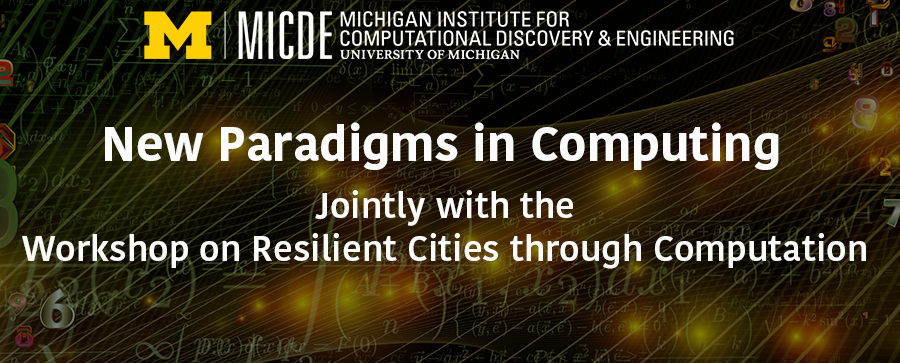On April 9 & 10, the Michigan Institute for Computational Discovery and Engineering will host its 2020 Annual Symposium.The symposium will feature talks by external experts who are driving new fronts in computing, and showcase some of the game-changing research supported by our Catalyst Grants program. As always, it will feature a poster competition highlighting notable computational work from U-M postdocs, students, and researchers.
The second day will feature the workshop on Resilient Cities through Computation convened by Project ICoR (Interdependencies in Community Resilience). This will include the Hackathon: Creating a Hybrid Simulation System Using the Simple Run Time Infrastructure Software, open to students from any institution.
More information at micde.umich.edu/symposium20
NEAR ZERO WASTE: Please note, this event aims to reduce waste at every point possible by using both recyclable and compostable materials. Please bring a reusable mug or water bottle, if you can.
-
MICDE 2020 Symposium: New Paradigms in Computing (Thursday, April 9; 8 a.m. - 5 p.m.)
Thursday, April 9, 2020
8:00 a.m. - 5:00 p.m.
Rackham 4th Floor
Over the past three years MICDE has funded innovative research projects in computational science. The symposium will feature showcase some of the game-changing research supported by the program.
CONFIRMED SPEAKERS
- Ewa Deelman (University of Southern California) – Keynote speaker
- Ian Foster (University of Chicago & Argonne National Laboratory) –Keynote speaker
- Long time-scale simulations using exponential time-propagators, Vikram Gavini (Mechanical Engineering)
- Integral equation based methods for scientific computing, Robert Krasny (Mathematics)
- Real-Time phase-resolved ocean wave forecast with data assimilation enabled by GPU-accelerated computation, Yulin Pan (Naval Architecture and Marine Engineering)
- Hierarchical computing for dynamic evolutionary inference of complexity, Stephen Smith (Ecology and Evolutionary Biology)
- Determining the 3D shape of Milky Way’s Dark Matter Halo, Monica Valluri (Astronomy) et al. -
Student Poster Competition (Thursday, April 9; 12 - 2:30 p.m.)
Thursday, April 9, 2020
12:00 - 2:30 p.m.
Rackham Assembly HallMICDE’s Annual Poster Competition highlights the outstanding computational work from U-M. All posters with a computational science component are welcome to present, but only those of current students and postdocs will be part of the competition.
Deadline to submit an abstract and the pdf version of the poster is April 1, 2020 at 5:00 p.m. E.T. Please make sure to click the “Student Poster Competition” option when you register.
To sign up for the competition click “Submit new abstract” either from the “Overview” page, or the “Student Poster Competition (Call for Abstracts)” page.
First place will be awarded $500, second $300 and third place $200.
-
Student Hackathon - Creating A Hybrid Simulation System Using The 'Simple Run Time Infrastructure software toolkit (Thursday, April 9; 5:00 - 9:00 p.m.)
Thursday, April 9, 2020
5:00 - 9:00 pm - dinner provided
Rackham West Conference Room (4th floor)The hackathon’s goal is to introduce the Simple Run-Time Infrastructure software toolkit (SRTI) to the participants, and provide a template project consisting of multiple simulators, each with a specialized purpose, relating to a natural-disaster scenario.
This is a free event and all students from any school/institution are welcome. You need basic coding skills to participate.
The first, second and third place winners will receive monetary prizes of $1000, $600 and $400.
The SRTI is a software toolkit meant to act as middleware for simulators and applications across different languages to share data with each other, with the primary goal of being user-friendly.
Participants will need to replace one of the simulators with their own (in a supported programming language of their choice) to improve the outcome of a virtual-agent’s survival.
The Java Runtime Environment (JRE) is required to run the SRTI. Please refer to icor.engin.umich.edu for more information on supported operating systems and languages. Participants will need to bring their own laptops to take part.
Individuals or groups of 2 people can participate in the event.
-
Resilient Cities through Computation (Friday, April 10; 9 a.m. - 1:45 p.m.)
Friday, April 10, 2020
9:00 am - 1:45 pm (lunch provided)
Rackham 4th Floor
Natural hazards research has evolved into highly specialized sub-disciplines, each dedicated to handling a subset of the overall problem. A key observation is that computational research is widespread in all subfields.
The “Resilient Cities through Computation” workshop will bring together researchers from across campus who are working on various aspects of disaster science and engineering to: 1) exchange information, and 2) discuss means by which to leverage their shared computational interest for achieving community resilience.
FEATURED SPEAKERS
- Sherif El-Tawil (Civil and Environmental Engineering)
- Therese McAllister (National Institute of Standards and Technology) – Keynote Speaker
- Richard Rood (Climate and Space Sciences and Engineering)
- Seymour Spence (Civil and Environmental Engineering)
- Ming Xu (School of Environment and Sustainability)
- Valeriy Ivanov (Civil and Environmental Engineering)
- Seth Guikema (Industrial & Operations Engineering)The workshop is sponsored by MICDE and the Department of Civil and Environmental Engineering under the auspices of its Adaptation research thrust. The event is organized by researchers from the NSF-funded Project ICoR (icor.engin.umich.edu).
